

Through the Lens of a Critical Friend. Teacher research and why it is more important than ever for our schools. Is teacher research still important and relevant?
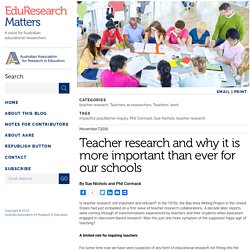
In the 1970s, the Bay Area Writing Project in the United States had just embarked on a first wave of teacher research collaborations. A decade later, reports were coming through of transformations experienced by teachers and their students when educators engaged in classroom-based research. Was this just one more symptom of the supposed ‘hippy age’ of teaching?
A limited role for inquiring teachers For some time now we have seen suspicion of any form of educational research not fitting into the ‘gold standard’ of randomized controlled trials. Currently, however, education systems are starting to see the limits of top-down reform and particularly of attempting to impose single solutions on teachers. THE EDUCATION HUB – For research-led teaching. Our Code, Our Standards. Have you read our latest Appraisal update?
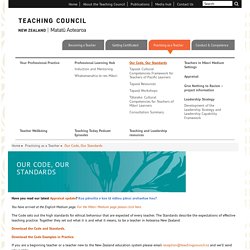
Kua pānuitia e koe tā mātou pānui arohaehae hou? You have arrived at the English Medium page. For the Māori Medium page please click here. The Code sets out the high standards for ethical behaviour that are expected of every teacher. The Standards describe the expectations of effective teaching practice. Download the Code and Standards. Download the Code Examples in Practice. If you are a beginning teacher or a teacher new to the New Zealand education system please email reception@teachingcouncil.nz and we'll send you a copy. Values These values underpin Our Code, Our Standards. WHAKAMANA: empowering all learners to reach their highest potential by providing high-quality teaching and leadership. MANAAKITANGA: creating a welcoming, caring and creative learning environment that treats everyone with respect and dignity.
PONO: showing integrity by acting in ways that are fair, honest, ethical and just. How were the Code and Standards developed? The Code.
Home » CORE Education. Escalation Ladder for sharing information about vulnerable children. Sharing information involves both the collection and disclosure of personal information.
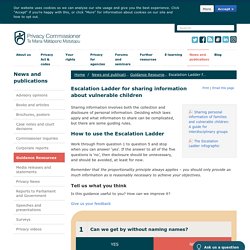
Deciding which laws apply and what information to share can be complicated, but there are some guiding rules. How to use the Escalation Ladder Work through from question 1 to question 5 and stop when you can answer ‘yes’. If the answer to all of the five questions is ‘no’, then disclosure should be unnecessary, and should be avoided, at least for now. Remember that the proportionality principle always applies – you should only provide as much information as is reasonably necessary to achieve your objectives.
Tell us what you think Is this guidance useful to you? Give us your feedback 1 Can we get by without naming names? BES Programme. RSL STRENGTH BASED PERSPECTIVE. Tataiako. Principles / RTLB Practice / Professional practice / Home - Resource Teacher: Learning and Behaviour. There are eight principles guiding RTLB practice: 1.
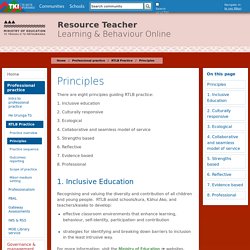
Inclusive education 2. Culturally responsive 3. 4. 5. 6. 7. 8. 1. Recognising and valuing the diversity and contribution of all children and young people. Effective classroom environments that enhance learning, behaviour, self-identity, participation and contribution strategies for identifying and breaking down barriers to inclusion in the least intrusive way. For more information, visit the Ministry of Education websites. 2. New Zealand communities are diverse, with many different cultures, ethnic, religious and socio-economic groups. The RTLB service supports the identified needs of students in their communities by: appreciating the diversity that individual RTLB bring to their cluster increasing the cultural competence of the RTLB workforce. RTLB practice will: This principle places importance on cultural knowledge and understanding and the right of Māori to define, protect, promote and control all their tāonga and resources.
Tātaiako. Intro to professional practice / Professional practice / Home - Resource Teacher: Learning and Behaviour. This section of the toolkit describes what RTLB practice looks like.
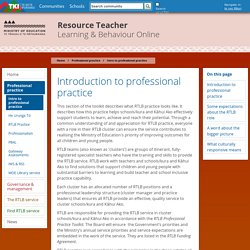
It describes how this practice helps schools/kura and Kāhui Ako effectively support students to learn, achieve and reach their potential. Through a common understanding of and appreciation for RTLB practice, everyone with a role in their RTLB cluster can ensure the service contributes to realising the Ministry of Education's priority of improving outcomes for all children and young people. RTLB teams (also known as 'clusters') are groups of itinerant, fully-registered specialist teachers who have the training and skills to provide the RTLB service.
Our Code Our Standards web booklet FINAL.pdf. He Urunga Tū / Professional practice / Home - Resource Teacher: Learning and Behaviour. He Urunga Tū is about: Tangata whenua People of the land.
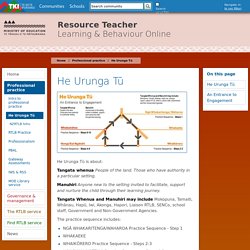
Those who have authority in a particular setting. Manuhiri Anyone new to the setting invited to facilitate, support and nurture the child through their learning journey. Tangata Whenua and Manuhiri may include Mokopuna, Tamaiti, Whānau, Hapū, Iwi, Akonga, Hapori, Liaison RTLB, SENCo, school staff, Government and Non-Government Agencies. The practice sequence includes: Education matters to me – six detailed reports are now available » Office of the Children’s Commissioner. Education matters to me – six detailed reports are now available News 14 March 2018 1.
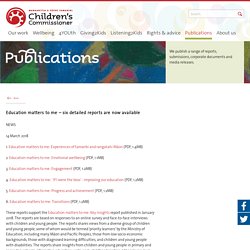
Education matters to me: Experiences of tamariki and rangatahi Māori (PDF, 1.4MB) Professional practice / Home - Resource Teacher: Learning and Behaviour.